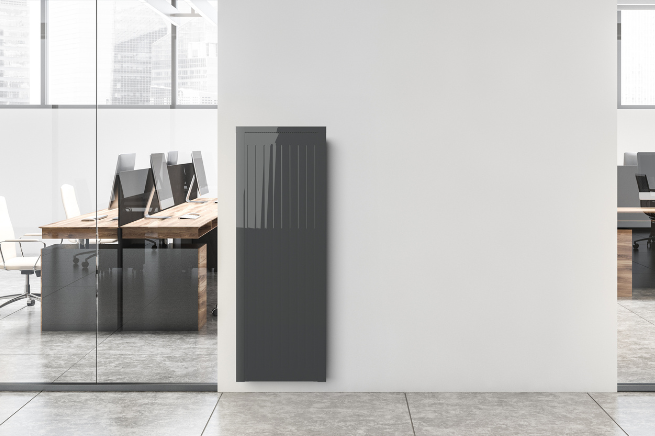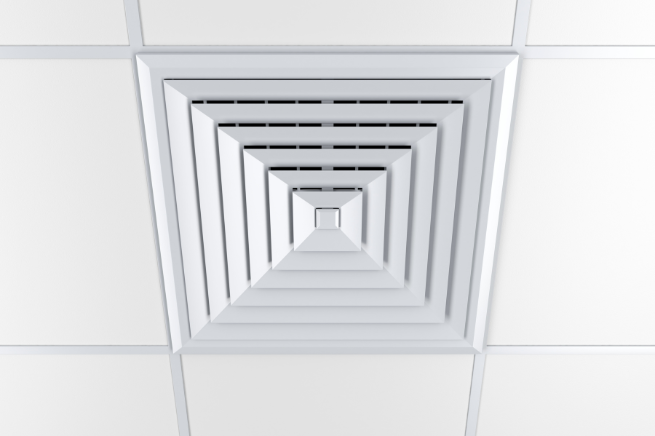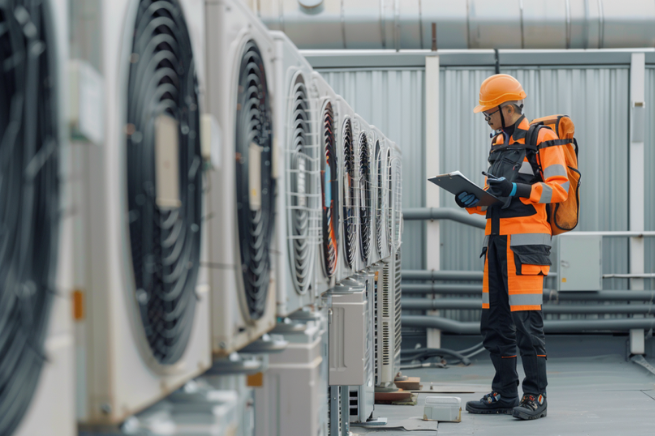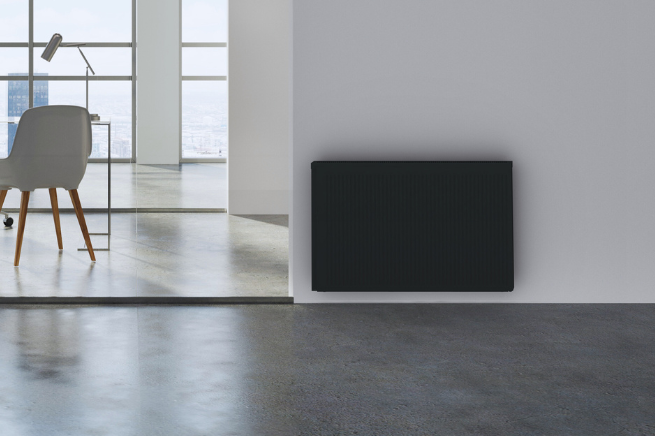
Heating your commercial building efficiently is crucial for saving on energy costs and keeping everyone comfortable in a productive environment. We know that commercial property managers don’t have a huge amount of time to research different types of commercial heating systems and weigh up their advantages or disadvantages, so we’ve done it for you. Let’s break down the options and see how modern systems, like the NEOS electric radiator, can make a world of difference in your commercial space.
If you’re specifically interested in the NEOS, download our commercial brochure for all the details you need.

Electric Radiators
Electric radiators, like the NEOS electric radiator, are a modern and efficient solution for commercial heating. These radiators use electricity to heat a core material, which then radiates heat into the space. Here are some pros and cons:
Pros of electric radiators:
Energy Efficiency: Electric radiators are highly efficient, converting 100% of electricity into heat.
Easy Installation: They are easy to install, often requiring only a power outlet, and can be used without significant modifications to the building.
Low Maintenance: Electric radiators require minimal maintenance compared to other heating systems.
Zone Control: They allow for precise control of heating in different areas, providing flexibility and energy savings.
Sustainability: Electric radiators are a great options for your organisations sustainability goal, and they can be paired with renewable energy sources, reducing the overall carbon footprint.
Cons of electric radiators:
Electricity prices: Depending on electricity prices, operating costs can be higher compared to gas or oil systems.
Power Supply: Requires a reliable electrical supply, which can be a limitation in some locations
Different types of electric radiators have various pros and cons, so it’s essential to choose the one that best fits your needs. Download our commercial brochure here to take a deeper look at the NEOS electric radiator and see how it stands out from the rest.

Warm air heating systems are a popular choice for commercial spaces because they heat the air directly and distribute it throughout the building. These systems typically consist of a central heating unit that uses a gas-fired burner or electric heater to warm the air. The heated air is then blown through a network of ducts and vents to various parts of the building. Here are some pros and cons:
Pros of warm air heating systems:
Efficient Air Distribution: The system ensures that warm air is evenly distributed, preventing hot and cold spots.
Versatility: Warm air heating systems can be integrated with air conditioning systems for year-round climate control.
Improved Air Quality: Many modern systems include air filtration, which can help improve indoor air quality by removing dust and pollutants.
Sustainability: Modern electric versions can be more eco-friendly, especially when paired with renewable energy sources.
Cons of warm air heating systems:
Noise: These systems can be noisy, which might be disruptive in quieter environments like offices.
Maintenance: Warm air systems require regular maintenance to ensure filters are clean and ducts are clear, which can add to operational costs.
Dry Air: They can dry out the air, potentially leading to discomfort for occupants and requiring the use of humidifiers.
Installation: Installing a warm air heating system can be complex and time-consuming, often requiring significant modifications to existing ductwork and ventilation systems.
Whole Life Cost: While initial costs can be moderate, ongoing maintenance and potential ductwork issues can increase long-term expenses.

Radiant heating systems, like radiant plaque heaters and radiant tubes, use infrared radiation to generate heat. They’re ideal for spaces with high ceilings or where you need floor-level heating. Here are some pros and cons:
Pros of radiant heating:
Comfort: Radiant heating provides quick heat distribution to objects and people nearby the heater.
Efficiency: These systems can be more energy-efficient as they directly heat objects and people in the space rather than the air.
Quiet Operation: Radiant heating systems are typically quiet, making them suitable for office environments.
Sustainability: Often considered eco-friendly as they can be powered by renewable energy sources.
Cons of radiant heating:
Cost: The initial installation cost can be higher compared to other systems.
Slow Heating: Radiant systems can take longer to heat a space compared to warm air systems (they heat objects near them first).
Limited Cooling: Unlike warm air systems, radiant heating does not provide a cooling option, requiring a separate system for air conditioning.
If you’re looking for a convection based system, have a look here!

Heat pumps are incredibly versatile—they can both heat and cool your building. By transferring heat from one place to another, they’re super energy-efficient. This makes them a great choice for buildings that need to manage heating and cooling year-round. Here are some pros and cons:
Pros of heat pumps:
Energy Efficiency: Heat pumps are highly efficient, often using less energy than traditional heating systems.
Dual Function: They can provide both heating and cooling, making them a versatile choice for year-round climate control.
Environmentally Friendly: Heat pumps generally have a lower carbon footprint compared to fossil fuel-based systems.
Cons of heat pumps:
Initial Cost: The upfront cost for installing a heat pump system can be higher than other heating systems.
Climate Limitations: In extremely cold climates, heat pumps may be less efficient and require a backup heating source.
Maintenance: Regular maintenance is required to keep the system running efficiently.
Whole Life Cost: While initial costs can be high, energy savings over time often justify the investment.
A classic option, gas boilers heat water which is then circulated through pipes to radiators or other heating elements. Today’s gas boilers are much more energy-efficient and cost-effective than older models. Here are some pros and cons:
Pros of gas boilers:
Efficiency: Modern gas boilers are highly efficient, providing a reliable and steady source of heat.
Cost-Effective: Natural gas is often less expensive than other fuel types, reducing operating costs.
Longevity: Gas boilers typically have a long lifespan with proper maintenance.
Cons of gas boilers:
Installation: Installing a gas boiler system can be complex and may require significant modifications to existing infrastructure.
Maintenance: Regular maintenance is needed to ensure safe and efficient operation.
Emissions: Gas boilers produce carbon emissions, which can be a concern for environmentally conscious businesses.
Whole Life Cost: While natural gas is cost-effective, maintenance and emissions control can add to long-term expenses.
Sustainability: Lower sustainability compared to electric systems due to reliance on fossil fuels.
Similar to gas boilers, oil boilers use oil as their fuel source. They’re often used in commercial properties without access to natural gas. Here are some pros and cons:
Pros of oil boilers:
Availability: Oil boilers are a viable option in areas where natural gas is not available.
Heat Output: Oil boilers can provide a high heat output, suitable for larger spaces.
Efficiency: Modern oil boilers are designed to be highly efficient.
Cons of oil boilers:
Fuel Storage: Requires on-site storage for oil, which can take up space and require regular refilling.
Cost: Oil prices can be volatile, affecting operating costs, we’ve included running costs of an oil system compared to other systems in our brochure here.
Emissions: Like gas boilers, oil boilers produce carbon emissions.
Whole Life Cost: High operational costs due to fuel price volatility and storage requirements.
Sustainability: Lower sustainability profile due to reliance on fossil fuels and higher carbon emissions.
Choosing the right commercial heating system is vital for creating a comfortable, efficient environment in your building. Modern solutions like the NEOS electric radiator offer exceptional energy efficiency, flexibility, and sustainability, making them ideal for a wide range of commercial buildings. By considering your specific needs and exploring the available options, you can ensure optimal heating performance and energy savings.
Ready to upgrade your commercial heating system? Discover how the NEOS electric radiator can transform your space. Contact our commercial team on 0800 599 1909 for personalised advice on finding the perfect heating solution for your commercial building, or download our commercial brochure for more information.

When choosing a heating system for your commercial building, keep these factors in mind:
Size and Layout
The size and layout of your space will determine what type of heating system you need. Large, open spaces might benefit from warm air heating or electric radiators, while smaller, divided areas might be better served by radiant heaters.
Energy Efficiency
Look for systems with high energy efficiency to save on costs and reduce your environmental impact. This will also help you work towards your organisations sustainability goals.
Installation and Maintenance Costs
Consider both the initial installation cost and the long-term maintenance and running costs. Systems that require less maintenance and have longer lifespans, like the NEOS - you see a return on investment within 5 years.
Control
Modern heating systems, like the NEOS electric radiator, come with bespoke control options that allow you to manage the temperature and energy usage of different areas individually. This customisation ensures optimal comfort and efficiency tailored to your specific needs. Whether it’s for housing, student accommodation, or office spaces, we can help you with control options. We understand that thermostats aren’t one size fits all, especially in commercial heating, so why not talk to us about bespoke heating controls alongside your NEOS radiators? See our bespoke app in our brochure here.
Specific Heating Needs
Different spaces have different heating requirements. A warehouse might need high-capacity warm air heaters, while an office could benefit from a mix of radiant heating and heat pumps. Talk to our commercial team to find the best heating solution for your space on 0800 599 1909 or email your floor plans to [email protected]
Choosing the right commercial heating system is vital for creating a comfortable, efficient environment in your building. Modern solutions like the NEOS electric radiator offer exceptional energy efficiency, flexibility, and sustainability, making them ideal for a wide range of commercial buildings. By considering your specific needs and exploring the available options, you can ensure optimal heating performance and energy savings.
Ready to upgrade your commercial heating system? Discover how the NEOS electric radiator can transform your space. Contact our commercial team on 0800 599 1909 for personalised advice on finding the perfect heating solution for your commercial building, or download our commercial brochure for more information.
Tags: General Guides, Understanding Heating.

If you are considering electric heating/electric radiators, then this guide tells you everything you need to know. Discover this modern, sustainable and economical method of heating that gives you complete control and comfort. Download Free Guide now.

*Trust Electric Heating needs the contact information you provide to us to contact you about our products and services. You may unsubscribe from these communications at any time. For information on how to unsubscribe, as well as our privacy practices and commitment to protecting your privacy, check out our Privacy Policy.
Quick installation and a 100 day warmth guarantee. Whether you’re buying one or several radiators, if our radiators don’t heat your room to a minimum of 20 degrees we will undertake to upgrade or replace the radiators free of charge.
Book your free consultation